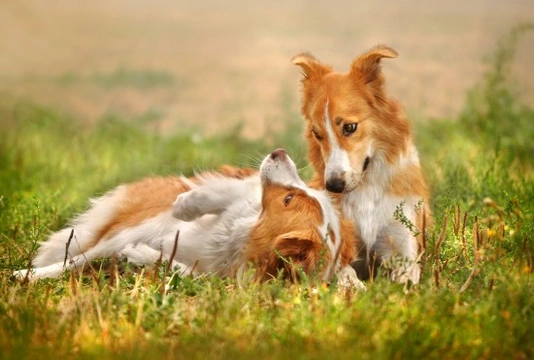
Dogs and their eye contact with each other, and what this means
While dogs have a range of vocal sounds at their disposal such as barks, growls and whines, dogs mainly communicate with each other through their body language. One of the most important forms of body language for both dogs and people is eye contact, and the messages that we pass-or don’t pass- back and forth between us with our eyes can be very telling. However, dog’s eye contact and what it means needs to be interpreted very differently than eye contact between humans; for instance, when two humans are talking, it is considered polite to look each other in the eye, and rude or potentially deceitful to avoid eye contact. Yet for dogs, direct eye contact is rude at best and taken as a challenge at worst, and so avoiding direct eye contact is considered to be the height of canine good manners.
In this article, we will look at the ways in which dogs use eye contact with each other, and what it means if your dog refuses to look at or make contact with another dog. Read on to learn more!
When dogs first meet
While it might not seem like it to the uninformed observer who sees two well socialised dogs meeting happily, sniffing and playing together from the get go, first meetings between two strange dogs can actually be very highly pressured situations for both parties!
Within just a few moments, the dogs will learn from each other who they are, if they are friendly, if they want to play, what they smell of, and which dog is likely to be in charge! Friendly, well socialised dogs will greet each other from the sides and circle around each other, viewing each other side on and not staring directly at each other. Dogs that stop and stand still, staring straight ahead when meeting, are giving cues to the other dog that they are potentially dominant and may not be interested in playing, other than on their terms!
Looking straight on at one another can be deemed to be a threatening behaviour, and in the majority of cases, one dog will soon break eye contact to avoid a potential stand-off or scuffle. Direct staring, rushing at a dog head-on or making steely eye contact are all rather rude, and also dominant cues to the other dog.
Canine negotiation
Eye contact and making and breaking it is a whole language of its own for dogs, and this fast-moving Morse code like process of looking and looking away is part of a complex process of communication between the two dogs. This forms the basis of a polite negotiation between the dogs, allowing them to get a look at each other and keep an eye out for danger or problems, without doing so in such a way that the other dog perceives it to be a challenge.
This is also one of the ways in which dogs can make requests and respect the requests made by each other. For instance, if one dog has a toy or a bone that they do not wish to share, they will use their body to shield it from the view of the other dog and look away from the other dog as a polite request to the other party not to interfere. If the other dog respects and heeds this request, their own eye contact and body language will be quite distinctive as well. They will avoid looking at the dog and the resource in question, and will actually appear to be making out as if they have not seen the resource at all, and ergo, that they do not see anything worth having!
Submissive lack of eye contact
A dog that is yielding submission to another dog will drop their eyes and possibly their whole head, to send the pronounced message to the other party that they are not looking at them and ergo, yield dominance to the other dog. The other dog can then either accept this or make a fuss about further reinforcing their dominance by forcing eye contact to well and truly put the other party in their place!
If a dog refuses to look at another dog (or you) they are not being wilfully ignorant; they are actually displaying a very appeasing message and good manners by giving dominance to the other party. For instance, when you meet a new dog out and about that is a little shy, if the dog in time lets you stroke or pet them, they may well keep their head turned away from you while you do so, as if they are totally disinterested! However, they are simply allowing and probably enjoying your attentions, while letting you know that they accept that you are boss.



